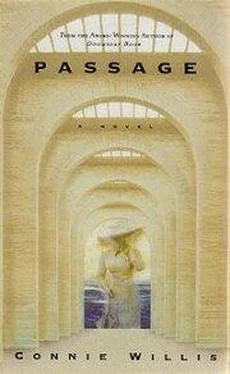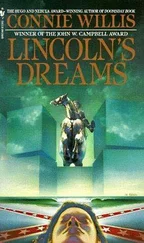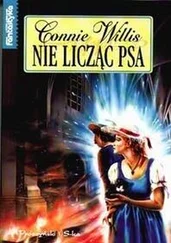“But then why didn’t she write down what she saw? If she was trying to prove discrepancies, she’d have wanted to document them, but there’s no mention of smoke or a fire or fog anywhere in her accounts, taped or written. And it’s in Maisie’s account, and Ms. Schuster’s. I think it’s the key.”
“Well, we’ll know in a few minutes,” Richard said, pointing at a sign barely visible in the fog: “Timberline 8 mi.”
The fog grew steadily thicker and the road twistier. Richard had to devote all his attention to seeing the center line. “ ‘…water…’ ” Kit read, “ ‘…no… blanked out…,’ and then two words with question marks after them, ‘cold? code?’ ”
“Tunnel,” Richard said.
“Tunnel?” Kit said. “How do you get ‘tunnel’ out of ‘cold’ and ‘code’?”
“Tunnel,” he repeated, and pointed. The arched mouth of a tunnel loomed ahead, black in the formless fog.
“Oh, a tunnel,” Kit said, and they drove into it.
It was dark, which meant it must be a short one. The longer tunnels, like the Eisenhower and the ones in Glenwood Canyon, were lit with gold sodium-vapor lights. This one was pitch-black beyond the range of their headlights, and foggy.
“Why would I have seen the Titanic, of all things?” Joanna had said. “I live in Colorado. There are dozens of tunnels in the mountains.”
And she was right, he thought. A tunnel like this was the obvious association. The narrow sides, the feeling of swift forward motion, the darkness. The tunnel must curve, because he couldn’t see the end, couldn’t see the light.
The light. There was no sensation of having driven around a curve, but he must have, because there was the mouth of the tunnel, blindingly bright and nearly upon them. Richard squinted against the sudden whiteness.
“A mountain tunnel would have been the logical association,” Joanna had said. The feeling of opening out into light, into space, the blinding brightness of eyes adjusting from blackness to daylight, no, brighter than that. Brilliant, dazzling. It’s too bright, Richard thought and felt a stab of fear. Why is it so bright?
Beside him, Kit put up her hand to shade her eyes, and the movement looked defensive, as if she were shielding herself from a blow. Where are we? Richard thought, and was out of the tunnel and into another world. Blue sky and glittering snow and white, pine-covered slopes.
“What happened to the fog?” Kit asked wonderingly.
“We must have climbed above it,” Richard said, though there had been no sensation of climbing either, but at the next curve in the road, they could see the white layer of cloud below them, blanketing the canyon.
“Heaven,” Kit murmured, and Richard knew she was thinking the same thing he was.
“Everything except the ringing or buzzing sound,” he said, and Kit’s cell phone rang.
“Mrs. Gray, is everything all right?” Kit said anxiously. It must be the Eldercare person. “Oh. In the cupboard above the sink, behind the oatmeal. I hope.” Kit punched “end.” “She couldn’t find the sugar,” she said to Richard, looking relieved. She picked up the transcripts. “I’d better finish reading these. We’re almost there.”
“Correction, we are there,” Richard said, pointing at a sign that said Timberline. He turned onto a narrow, snowy road, and then a narrower, snowier one, and stopped in front of an elaborately rustic-looking chalet.
“I can’t believe it,” Kit said as they walked up to the door. “We’re going to find out what Joanna was trying to tell us.”
A woman met them at the door, looking surprised and a little wary.
“Mrs. Aspinall?” Richard said, wondering suddenly how to explain their mission here without sounding crazy. “I’m Dr. Wright. This is Ms. Gardiner. We’re from Mercy General. We—”
“Oh, come in,” she said, opening the door wide. “How nice of you to come all this way! Carl’s in the family room. He’ll be so pleased to see you.” She took Richard’s coat and hung it up. “Dr. Cherikov was here yesterday.” She took Kit’s coat. “All his doctors have been so nice, coming to check on him.”
“Mrs. Aspinall—” Richard began, but she was already leading them down a long, pine-paneled hall, telling them about Carl’s condition.
“He’s making wonderful progress, especially now that we’re up here. He’s stopped having the nightmares—”
“Mrs. Aspinall,” Richard said uncomfortably. “I’m afraid there’s been a misunderstanding. I’m not one of Mr. Aspinall’s doctors.”
Mrs. Aspinall stopped in midhall and turned to face them. “But you said you were from Mercy General.”
“We are,” Richard said. “We were friends of Joanna Lander’s. She was my partner on a research project.”
“Oh,” Mrs. Aspinall said. She hesitated, as if she were going to show them the door, and then led them on down to the door at the end of the hall. It wasn’t the family room. It was a decidedly unrustic kitchen. “Would you like some tea?”
“No, thanks,” Richard said. “Mrs. Aspinall, the reason we came—”
“I was so sorry to hear of Dr. Lander’s death,” Mrs. Aspinall said. “She was so kind to Carl and to me. She used to come and sit with Carl so I could go get something to eat.” She shook her head sadly. “Such a terrible tragedy! There’s so much violence everywhere these days. It upset Carl terribly.”
Good, at least he knows, Richard thought, and we won’t walk into a hornet’s nest the way we did with Maisie, but he asked, just in case. “You told your husband about her death?”
“I wasn’t going to. He was still so fragile, and he didn’t know her.” She smiled apologetically. “It’s so hard for me to remember that all the people who cared for him all those weeks and who I know so well are total strangers to him.”
Richard and Kit looked at each other across the table. “But Carl heard the nurses talking,” Mrs. Aspinall went on, “and when Guadalupe came into the room, he could see she’d been crying, and he knew something was wrong. He was convinced I was keeping something from him about his illness, so I ended up having to tell him.”
“Mrs. Aspinall,” Richard said, “the day Dr. Lander died, she was on the track of something important, something to do with the project we were working on. We’re talking to everyone she saw that day, which is why we’re here. We’d like—”
Mrs. Aspinall was shaking her head. “I didn’t see her that day. The nurses told me she’d been in two days before to see him, but I wasn’t there. The last time I saw her was at least a week before that, so I’m afraid I can’t help you. I’m sorry.”
“Actually, it’s your husband we want to talk to,” Richard said.
“Carl?” she said, bewildered. “But he never even met Joanna. I don’t think you understand, my husband was in a semicomatose state until—”
“—the morning of the day Joanna died,” Richard said. “She had a conversation with him that morning, just after he regained consciousness.”
“Are you sure? Carl didn’t say anything about talking to her,” she said and then frowned, “but he was dreadfully upset when I told him about her. I thought it was because he’d been so close to death himself, that he was so frightened of it, but… when could she have seen him? I came as soon as they told me he was awake, and I was with him the rest of the day.”
“At eleven-thirty,” Richard said, hoping he was right.
“Oh,” Mrs. Aspinall said, nodding. “That was just before I got there.” And just after Carl regained consciousness, Richard thought, when his vision would have been fresh in his memory.
“But I still don’t understand,” Mrs. Aspinall said. “You say she was on the track of something regarding your research project? Why would she have told Carl about it?”
Читать дальше












